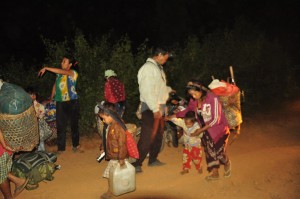International and local human rights groups have demanded the USA and UK pressure Thein Sein’s government to stop the Burma Army’s use of air and artillery bombardments against the Kachin.
 In the most recent attack on the Kachin town of Laiza the Burma Army fired heavy artillery into civilian areas – killing three and wounding a number of people.
In the most recent attack on the Kachin town of Laiza the Burma Army fired heavy artillery into civilian areas – killing three and wounding a number of people.
British Foreign Office Minister Alistair Burt, speaking on behalf of the UK government in parliament on the 14th of January, expressed deep concern over the escalation in Kachin State “including the use of Burmese military helicopters and aircraft against Kachin Independence Army positions in areas around the state capital and Laiza.”
Alistair Burt called for an immediate cessation in hostilities in Kachin State. “There must be unhindered humanitarian access to conflict affected areas.”
While the British government has welcomed the limited reforms that have taken place in Burma, the Kachin conflict “could present a threat to these wider reforms.”
The statement to the UK parliament comes as international and local human rights groups stepped up their condemnation of the conflict that has seen more than 100,000 Kachin civilians displaced.
A joint statement of Kachin organizations stated that the Burma Army was guilty of war crimes in the conflict.
“These mortar attack on civilians in the Kachin town of Laiza, which have resulted in three deaths and the wounding of several others, amounts to the war crime of murder” said Moon Nay Li, coordinator of the Kachin Women’s Association Thailand.
Christian Solidarity Worldwide (CSW), an international human rights advocacy group, added to the calls of condemnation.
“Today’s bombardment of Laiza and the direct attacks on civilians are inconsistent with President Thein Sein’s promises of reform. We call for urgent international action to pressure the government to stop these attacks immediately, to allow unhindered international humanitarian access to all affected areas, and to engage in a genuine peace process to rebuild trust, begin a political dialogue and move towards national reconciliation,” CSW Chief Executive Mervyn Thomas said.
Human rights groups have warned that the use of heavy bombardment by the Burma Army, including helicopter gunships and heavy artillery, risk a greater number of civilian casualties.
Kachin sources report that on the 14th of January the Burma Army attacked the town of Laiza, the Kachin Independence Organisation (KIO) headquarters, at 08.15am local time, firing 105 and 155mm artillery shells three times. It is the first time the Burma Army has directly attacked Laiza.
Among the injured were a two-and-a-half year-old girl, Jangma Bawk San, her mother Lagoi Sau Nam, aged 38, an eight-year-old girl, Langjaw Nu Jai, and a 56 year-old woman, Nang Zing Roi Ji. The three civilians who were killed were Pastor Malang Yaw, aged 76, Hpauyu Doi San Awng, aged-15 and one other unidentified victim.
On the 14th of January at village, Phakant area, 117 miles from the Kachin state capital Myitkyina, the Burma Army opened fire on civilians. An unknown number were killed and several injured. Kachin sources said the KIA, does not have a base in Kahtan village and there was no armed conflict with the KIA in the area.
The attacks follow three weeks of aerial bombardment by the Burma Army using jet fighters and helicopter gunships.
“Britain and the USA have argued that their policy of effectively befriending the Burmese government will give them more influence, but what we see on the ground is continuing violations of international law,” said Zoya Phan, Campaigns Manager at Burma Campaign UK.
“If the Burmese Army were firing mortar bombs at civilians in Rangoon rather than in Kachin State, would the British government still be bringing trade missions and would the USA still be inviting the Burmese Army to military exercises?” she said.
The condemnation by human rights groups comes as western democracies have led the charge towards sanctioning foreign investment in Burma as reward will for the democratic reforms.
Yet the extent to which the reforms have changed the culture of brutality within Burma’s military is much harder to quantify, with human rights abuses still taking place on a daily basis.
In his Report to the United Nations General Assembly in September 2012, the United Nations Special Rapporteur on Burma, Tomás Ojea Quintana, highlighted human rights abuses committed by Burma’s Army, including, “attacks against civilian populations, extrajudicial killings, sexual violence, arbitrary arrest and detention, internal displacement, land confiscations, the recruitment of child soldiers, forced labour and portering, and the use of landmines.”
Some analysts argue that the Kachin War is evidence that there is a split between Burma’s reformist government and the military, but Burma Campaign, an international human rights advocacy group based in the UK, says this argument is disingenuous.
“The argument that President Thein Sein has tried and failed to stop the Burmese Army attacks in Kachin State is simply not credible,” the group said in a statement.
“It is very hard to believe that President Thein Sein could not stop the attacks if he really wanted to. He was a General who was a lifelong soldier, was on the ruling council of the previous dictatorship since 1997, and was trusted and hand-picked by Than Shwe to take over when he stood down.”
Since the conflict erupted in June 2011, an estimated 100,000 Kachin have been forced to flee their homes.



